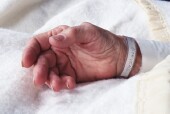DNR orders generally associated with the likelihood of favorable neurological survival
TUESDAY, Sept. 22, 2015 (HealthDay News) — For patients who receive successful resuscitation from in-hospital cardiac arrest, do-not-resuscitate (DNR) orders are generally associated with likelihood of favorable neurological survival, according to a study published in the Sept. 22/29 issue of the Journal of the American Medical Association.
Timothy J. Fendler, M.D., from Saint Luke’s Mid America Heart Institute in Kansas City, Mo., and colleagues examined whether patients’ decisions for DNR orders correlate with expected prognosis after successful resuscitation from in-hospital cardiac arrest. Data were included for 26,327 patients with return of spontaneous circulation at 406 U.S. hospitals.
The researchers found that 22.6 percent of patients had DNR orders within 12 hours of return of spontaneous circulation. Patients with versus without DNR orders were older and had higher rates of comorbidities. Overall, 7.1 percent of patients with the best prognosis had DNR orders, with a predicted favorable neurological survival of 64.7 percent. Thirty-six percent of those with the worst expected prognosis had DNR orders, with a predicted rate for favorable neurological survival of 4.0 percent (P < 0.001 for both trends). Patients without DNR orders had a higher actual rate of favorable neurological survival than those with DNR orders (30.5 versus 1.8 percent); the pattern of lower survival among patients with DNR orders was seen regardless of expected prognosis.
“Although DNR orders after in-hospital cardiac arrest were generally aligned with patients’ likelihood of favorable neurological survival, only one-third of patients with the worst prognosis had DNR orders,” the authors write. “Patients with DNR orders had lower survival than those without DNR orders, including those with the best prognosis.”
Copyright © 2015 HealthDay. All rights reserved.








